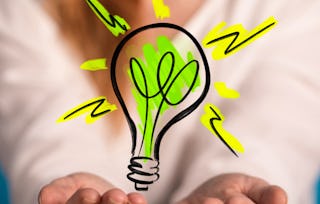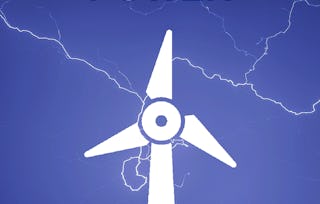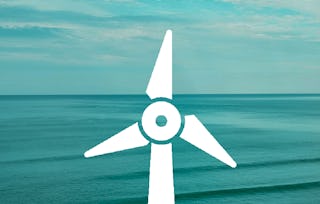Renewable energy is one of the fastest growing industries on the planet, with billions of dollars invested each year to meet international energy sustainability goals. This course will provide you with a solid foundation for understanding and deploying important renewable energy technologies such as wind and solar. In addition, you will come away with a good understanding of important energy storage technologies such as pumped hydro, batteries, and hydrogen.

Renewable Energy Technology Fundamentals
Ends soon: Gain next-level skills with Coursera Plus for $199 (regularly $399). Save now.

Renewable Energy Technology Fundamentals
This course is part of Renewable Energy Specialization

Instructor: Stephen R. Lawrence
44,324 already enrolled
Included with
(777 reviews)
Recommended experience
What you'll learn
You will understand the key physical characteristics of renewable energy and electricity
You will have the knowledge to assess the advantages and disadvantages of wind, solar, and other important renewable energy technologies.
You will be able to evaluate and recommend alternative renewable energy storage technologies.
Skills you'll gain
Details to know

Add to your LinkedIn profile
5 assignments
See how employees at top companies are mastering in-demand skills

Build your subject-matter expertise
- Learn new concepts from industry experts
- Gain a foundational understanding of a subject or tool
- Develop job-relevant skills with hands-on projects
- Earn a shareable career certificate

There are 5 modules in this course
Any understanding of renewable energy requires vocabulary, principles, and tools – that is the objective of this week’s module. We first define “energy.” What is it? Where does it come from? How is it measured? What are its rules? We then turn our attention to electricity and ask similar questions. What is electricity? How is it measured? How can renewable resources be used to generate electricity? Upon completion of this module, you will have a solid grounding in the underlying concepts required to understand the promise and challenges of renewable energy technologies.
What's included
10 videos10 readings1 assignment
This week we turn to wind energy – currently the most rapidly growing global source of renewable energy. First, we investigate how do winds arise? What are the important characteristics of wind? And how much energy is embodied in wind? We then describe how wind turbines extract energy from wind, and detail the components, performance, and economics of wind turbines. Along the way we pay close attention to rapidly evolving offshore wind technologies and their use.
What's included
11 videos8 readings1 assignment1 discussion prompt
Solar radiation is the most abundant source of renewable energy on earth. Given this abundance, how can it be transformed for human use? In this module we investigate several ways to turn sunlight into electricity. We first describe the attributes of solar radiation and the various ways that sunlight is useful for humans. Next, we introduce photovoltaic (PV) technologies, and how they are used to generate abundant electricity. We conclude with an examination of solar PV project applications, planning, and economics.
What's included
9 videos6 readings1 assignment1 discussion prompt
While wind and solar are the fastest growing renewable energy technologies globally, hydroelectric power remains the largest, and other technologies also have long histories. In this final module, we first describe six of these technologies, including hydropower, biomass energy, concentrating solar power, geothermal power, and ocean energy. Since effective and economic energy storage is critically important for the long-term success of renewable energy, we next turn to energy storage technologies, including pumped hydro, batteries, thermal storage, and hydrogen storage, plus several emerging storage technologies. We conclude with forecasts for the success of both renewable energy generating technologies, and renewable energy storage technologies.
What's included
15 videos5 readings1 assignment1 discussion prompt
The last week of Renewable Energy Technology Fundamentals includes a final exam that will allow you to demonstrate your mastery of the content covered in this course. Take some time to study, review any concepts or topics you found challenging, and then take the final exam!
What's included
1 assignment
Earn a career certificate
Add this credential to your LinkedIn profile, resume, or CV. Share it on social media and in your performance review.
Instructor

Offered by
Explore more from Environmental Science and Sustainability
 Status: Free Trial
Status: Free TrialUniversity of Colorado Boulder
 Status: Preview
Status: PreviewUniversity at Buffalo
 Status: Free Trial
Status: Free TrialUniversity of Colorado Boulder
 Status: Free Trial
Status: Free TrialUniversity of Colorado Boulder
Why people choose Coursera for their career




Learner reviews
777 reviews
- 5 stars
81.33%
- 4 stars
15.95%
- 3 stars
1.80%
- 2 stars
0.51%
- 1 star
0.38%
Showing 3 of 777
Reviewed on Aug 27, 2022
This course provide foundation knowledge for renewable energy technology, simple to follow by video, specific reading and there are many examples
Reviewed on Oct 1, 2022
The course is very well-structured. It gives the right fundamentals to understand the current and future scope of the energy technologies.
Reviewed on Dec 7, 2022
I found this course very interesting and well built. It was sufficiently "basic" for me to understand most of it and I have learned a lot!

Open new doors with Coursera Plus
Unlimited access to 10,000+ world-class courses, hands-on projects, and job-ready certificate programs - all included in your subscription
Advance your career with an online degree
Earn a degree from world-class universities - 100% online
Join over 3,400 global companies that choose Coursera for Business
Upskill your employees to excel in the digital economy
Frequently asked questions
To access the course materials, assignments and to earn a Certificate, you will need to purchase the Certificate experience when you enroll in a course. You can try a Free Trial instead, or apply for Financial Aid. The course may offer 'Full Course, No Certificate' instead. This option lets you see all course materials, submit required assessments, and get a final grade. This also means that you will not be able to purchase a Certificate experience.
When you enroll in the course, you get access to all of the courses in the Specialization, and you earn a certificate when you complete the work. Your electronic Certificate will be added to your Accomplishments page - from there, you can print your Certificate or add it to your LinkedIn profile.
Yes. In select learning programs, you can apply for financial aid or a scholarship if you can’t afford the enrollment fee. If fin aid or scholarship is available for your learning program selection, you’ll find a link to apply on the description page.
More questions
Financial aid available,

